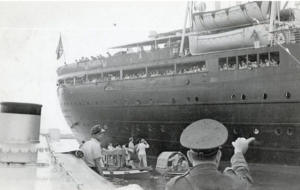The story of ‘the boat the world failed’ has resonance today
 Eighty years ago this week, a German ship carrying 937 Jewish refugees from Nazi Germany was denied entry to the USA. Many of the passengers refused asylum ultimately perished in Nazi death camps.
Eighty years ago this week, a German ship carrying 937 Jewish refugees from Nazi Germany was denied entry to the USA. Many of the passengers refused asylum ultimately perished in Nazi death camps.
The story of the SS St Louis, and other incidents like it, helped forged post-war international agreements about the rights of refugees. Some of those rights are again under threat.
In words echoing those of various current governments, the State Department telegram delivering the decision to refuse the St Louis permission to dock declared that its passengers must “await their turns on the waiting list and qualify for and obtain immigration visas before they may be admissible into the United States”.
For many of the passengers, this was a death sentence consigning them to their fates in Hitler’s concentration camps.
President of the Jewish Community Council of Victoria (JCCV), Jennifer Huppert says the incident was a seminal historical moment.
“The fact that it was turned back was very significant. It’s really an example of the difficulty of people seeking asylum at time. There was no-where for the Jews to go when the Nazis took over Europe,” Ms Huppert said.
As the USA is once again closing its borders, this time to Central Americans seeking refuge, publicity has focused on the 80-year-anniversary of the St Louis and its influence on the principles of international refugee law.
When the ship departed Hamburg for Havana on May 13th, 1939, Hitler’s Final Solution had already begun. In late 1938, the Nazis began to orchestrate the large-scale property destruction, murder and incarceration of Jews which are the characteristics of the Holocaust.
Many Jews had fled Germany by various means, including by boat to Cuba, which had accepted some 2,200 Jews among a broader influx of pre-war refugees.
In Cuba, however, anti-immigration sentiments were rising due to the increased competition it created for the scarce supply of jobs.
Although the majority of passengers had been granted landing certificates before beginning the voyage, upon the arrival of the St Louis in Cuba, only 22 Jewish refugees were allowed entry.
Facing the prospect of a return to Nazi Germany, and with Florida so close that they could see the lights of Miami, some of the passengers on the boat cabled President Franklin Roosevelt to ask for help.
In reply, they received only the telegram from the State Department.
Bereft, the ship returned to Europe, where the remaining passengers were begrudgingly accepted across Great Britain, the Netherlands, Belgium and France.
Those accepted by Great Britain escaped from the camps. However, most of the rest were doomed to be consumed once more by Nazism as Hitler advanced West over the course of World War Two.
As such, the Holocaust claimed 254 of them.
This tragic story is emblematic of the general anti-Semitic sealing of borders observed around much of the world at the time, the object of post-war shame which formed the backdrop for the consequent discussions about a nation’s ethical obligations to refugees.
Most relevant among the post-war reform efforts are the 1948 Universal Declaration of Human Rights, and the subsequent 1951 Convention Relating to the Status of Refugees, a multilateral United Nations treaty of 145 nation-parties.
While the declaration pioneered the assertion that individuals have the right to seek asylum from persecution, the convention explored the details of delivering these ideals in far greater depth.
One of the principles which stemmed partly from the story of the St Louis was that of non-refoulement, which bars any signatory nation from forcing refugees to return to any country in which they are liable to persecution or violence.
Today, nations argue that the principle only applies once a refugee has entered past a border and do not recognise the claims of people who have passed through third countries.
Ms Huppert extended her support to the people in such situations on behalf of the Jewish community.
“The Jewish community of Melbourne are very much influenced by the Holocaust. They are very aware of what it’s like to be a refugee, and of the impact being stateless has on people. For this reason, the Jewish community remains very concerned about the plight of refugees,” she said.
“Personally, my Father was a stateless person who found a home in Australia. There is nothing quite the same as the Holocaust, it was a unique situation. But there still are people caught in that stateless situation,” Ms Huppert said.












